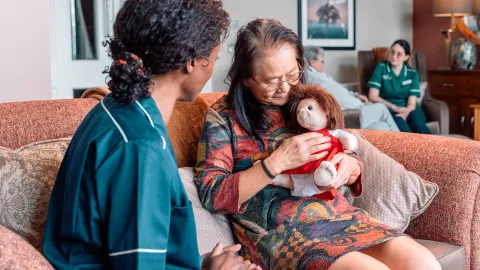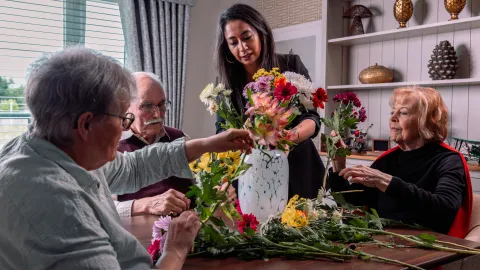Older people care in other cultures
From the Queen and the Royal family to fish 'n' chips, afternoon tea and the seaside, being British means many things to many people. Indeed, our cultural identity often depends on what we were taught by our parents, as well as our own life experience. But have you ever thought about how our cultural identity influences how we approach care?
For many people around the UK, what care we'll need as we get older is still a taboo topic, and conversations about later life are often seen as awkward to have, but is this attitude shared by other cultures? We explore some of the ways countries around the world manage an ageing population and how they approach care.
Norway
Norway is often said to be leading the way when it comes to caring for older people. The nation’s simple approach focuses on how people can be supported to maintain their independence for as long as possible. Norwegian experts have focused on finding ways that technology can better support older people as their needs change, as well as the importance of bringing different generations together.
Norway has an impressive pension fund system and the Agreement on a More Inclusive Working Life that encourages businesses to hire older workers, as well as the National Council for Senior Citizens that represents elderly citizens at a national level.
Gustavo Toshiaki, an economist and global ageing specialist based in Norway, told the Telegraph that the country is taking a "very practical approach to the situation", adding that “Norway doesn’t see older people as a problem”.
China
In China it's illegal for children to not look after their parents as they age, or to "neglect or snub" the elderly. The Elderly Rights Law also dictates that children must make arrangements to visit their parents or older relatives "often" regardless of travel or transport issues.
The boundaries of the law are not always clear, but it certainly gives caregivers the right to call children or grandchildren to remind them to visit their relative. They could also opt for legal action if family members are not seen to be taking their responsibility seriously. In China, caring for your older parents is seen as a repayment for the time, energy, and financial support given throughout childhood. With a population as large as China's, it would also be near impossible for the state to provide quality care without support from relatives.
France
France is developing a caregiving method that focuses on eye contact, touch and verbal communication to ensure older patients feel respected on a human level. Known as "Humanitude", it's becoming increasingly popular in dementia care and other areas where people may feel overwhelmed by the care they're receiving.
The four pillars of the method - making eye contact, talking to, touching and helping patients to stand - are focused on delivering care that has gentleness and kindness at its core. It aims to build trust between caregivers and the people they are supporting from the first interaction. For people with dementia this means always approaching them from the front to avoid surprising them, and explaining what's happening even if they seem uncommunicative.
Japan
Japan is thought to be the world's "oldest" country, meaning it has more people over the age of 65 than anyone other nation. It's estimated that more than a quarter of Japan's population are in this demographic and, with the world's highest life expectancy, the country has had to face older life care head on. This presents a challenge for health and social services that many countries are familiar with.
Japan, like many other Asian countries that believe in the Confucian principle of filial piety, which holds them to a moral of respect for the elderly and ancestors. This means the country tries to focus on recognising the value of people as they age. Known as 'ikigai', the life purpose of older Japanese people is seen as simply evolving from being about work and contributing financially to the role they can play in society and in their families.
According to Yoshiko Matsumoto, a linguistics professor at Stanford University, there is a profound awareness in Japan "that isolation is not good". Because of this, businesses are already looking at how they can support their employees as they age.
"If you have purpose in your life and people around to share your issues, that brings happiness," Matsumoto added.


